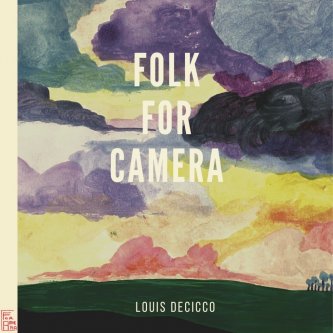When I finished the first of the seven tracks that would make up Folk for Camera, I had only two sure things: the sound of my slide guitar and the open tuning in which I played it. Summer had recently ended and I was preparing to face the long fall lockdown away from home, trying to engage in something that would keep me connected to the world while also giving me the excitement and energy I was deprived of: traveling, discovering, being with my family.
I think it was the combination of all these factors and coincidences that led me in the choice of the name Folk for Camera, the latter word with the Italian meaning of "room”, or sets of eight verses in sixteenth-century Italian poetry (stanza).
But this was a meaning I discovered later.
Room, was at first the space inside the house in Berlin where I was hosted, where I started a sort of guided meditation that led me to go out beyond the limits of that same house, city, to explore the world without the weight of the body, but only with the sincere curiosity of dreams.
Day after day I deepened that incredible human resource that is Zen, through the writings of Daisetz T. Suzuki, Jun'ichirō Tanizaki, Takuan Soho, and many other books in the apartment's library. The sound of the slide guitar became an invitation to a relaxation, a spatial dilation, a pleasant loss of orientation.
The room became a stanza, and the stanza became my whole world where I gradually began to collect images, books, sounds that I came in contact with during my stay.
There are the aforementioned Zen books, but also the orchestrations of Ennio Morricone and Bruno Nicolai, spaghetti-western movies, Bi Gan's movies, turkish songs that came in through the window, the paintings of Friedensreich Hundertwasser etc...
Most of these inputs have been embodied by a real musical instrument, which partly explains why there are so many of them throughout the album.
This was also possible thanks to the collaboration of friends who lent themselves to this experiment and to whom I set just one condition: the recording must take place in a room. An artistic decision that, as I explained, was first of all the result of a necessity and that in the end gave a "chamber-ish" sense to the album, where the popular instruments become the soloists of a parlor orchestra.
This has slowly recalibrated my sonic compass, and directed my artistic research, voluntarily messing up cultural references and traditions. Attempts whose purpose, if there was one, is to constantly take the listener away from the "main road", beyond the walls of common feeling (as the third track of the album, Pomerion, suggests), an invitation to pleasantly get lost.
This particular feeling is related to the last meaning of room, which is the English one of movie-camera. The whole CD must be accepted in its constant imbalance between dream and truth, in its imperfection and therefore in its possibilities.
Every track is a room that wants to be lived in but not inhabited: only that way can a room always be the beginning of a revolution, a poem, a transformation.

Folk for Camera
Louis DeCicco
Descrizione
Credits
Gigi “Luis” DeCicco: Resophonic guitar, Banjo, harmonica, Lap steel, Saz Baglama, Cumbus, Zither, Mandolinette, Violinette, Bulbul Tarang, Bass, Hohner Planet, Vertical Piano, Electric guitar, Tape machine
Nicola Mazzocchi: Tabla,Udu drum, Roland RD 1000, Tascam Porta 244, drums, talking drum, percussions
Marco Coviello: drums, distorted drums, effects
Corrado Ciervo: violin, viola
Recorded and produced by Luis DeCicco
Drums on #2,#3 recorded by Andrea Vitiello
Mastered by Luca Tacconi @ Sotto il Mare Studios

COMMENTI